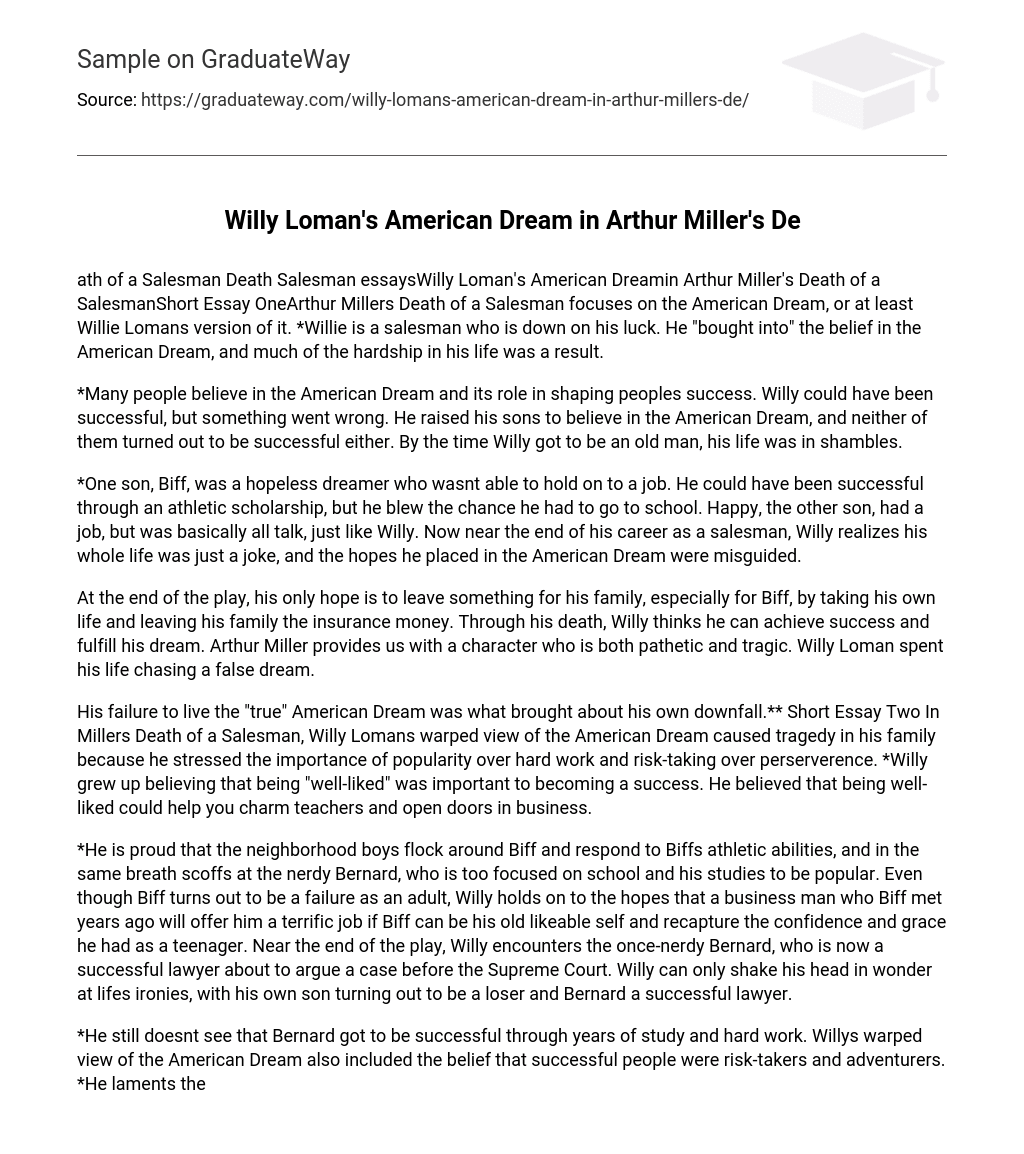ath of a Salesman Death Salesman essaysWilly Loman’s American Dreamin Arthur Miller’s Death of a SalesmanShort Essay OneArthur Millers Death of a Salesman focuses on the American Dream, or at least Willie Lomans version of it. *Willie is a salesman who is down on his luck. He “bought into” the belief in the American Dream, and much of the hardship in his life was a result.
*Many people believe in the American Dream and its role in shaping peoples success. Willy could have been successful, but something went wrong. He raised his sons to believe in the American Dream, and neither of them turned out to be successful either. By the time Willy got to be an old man, his life was in shambles.
*One son, Biff, was a hopeless dreamer who wasnt able to hold on to a job. He could have been successful through an athletic scholarship, but he blew the chance he had to go to school. Happy, the other son, had a job, but was basically all talk, just like Willy. Now near the end of his career as a salesman, Willy realizes his whole life was just a joke, and the hopes he placed in the American Dream were misguided.
At the end of the play, his only hope is to leave something for his family, especially for Biff, by taking his own life and leaving his family the insurance money. Through his death, Willy thinks he can achieve success and fulfill his dream. Arthur Miller provides us with a character who is both pathetic and tragic. Willy Loman spent his life chasing a false dream.
His failure to live the “true” American Dream was what brought about his own downfall.** Short Essay Two In Millers Death of a Salesman, Willy Lomans warped view of the American Dream caused tragedy in his family because he stressed the importance of popularity over hard work and risk-taking over perserverence. *Willy grew up believing that being “well-liked” was important to becoming a success. He believed that being well-liked could help you charm teachers and open doors in business.
*He is proud that the neighborhood boys flock around Biff and respond to Biffs athletic abilities, and in the same breath scoffs at the nerdy Bernard, who is too focused on school and his studies to be popular. Even though Biff turns out to be a failure as an adult, Willy holds on to the hopes that a business man who Biff met years ago will offer him a terrific job if Biff can be his old likeable self and recapture the confidence and grace he had as a teenager. Near the end of the play, Willy encounters the once-nerdy Bernard, who is now a successful lawyer about to argue a case before the Supreme Court. Willy can only shake his head in wonder at lifes ironies, with his own son turning out to be a loser and Bernard a successful lawyer.
*He still doesnt see that Bernard got to be successful through years of study and hard work. Willys warped view of the American Dream also included the belief that successful people were risk-takers and adventurers. *He laments the fact that he never took his brothers offer to move to Alaska to make his fortune. He envisions Biff, the once-great high school athlete, becoming a success through starting a sporting goods company.
He believes people would be drawn to the company by Biffs charisma, athletic ability, and Loman name. Willys last-ditch effort to make something of his life by killing himself in an automobile “accident” and handing over the insurance money to Biff is another scheme destined to failure. *In contrast, we see his friend Charlie, who is living the real American Dream. Charlie has worked hard and perservered in the business world, successful enough to give money to Willy just to help him pay his bills.
*Arthur Miller shows us that the American Dream is valid, but those who hope to substitute popularity and lucky breaks for hard work are likely to fail.





